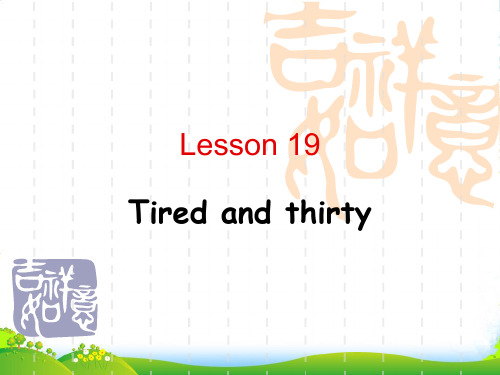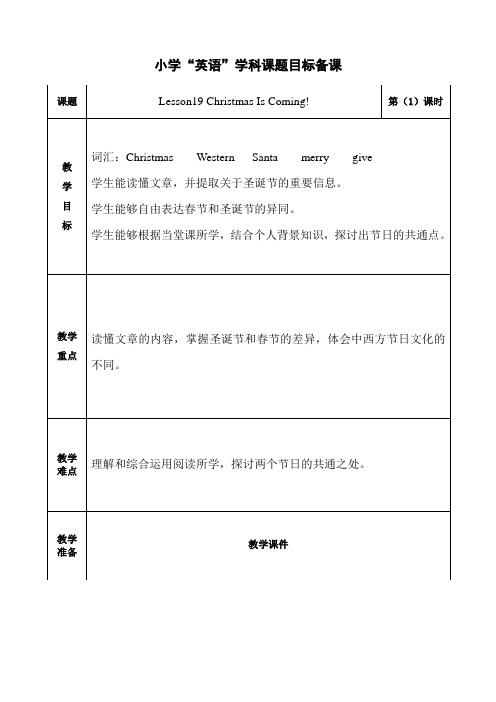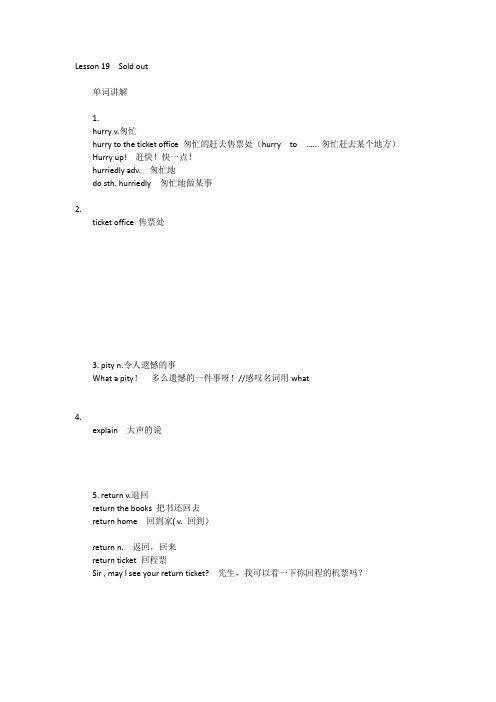lesson19
新概念英语第二册Lesson19(共55张PPT)

hurry in( come in 进来)匆匆忙忙地进来 hurry out (go out 出去)匆匆忙忙地出去 ② n. 急忙,匆忙,仓促 in a hurry <n.>匆忙 in no hurry <n.> 不匆忙 Sorry, I am in a hurry.对不起,我赶时间。 In his hurry to school, he forgot his books. In a/his hurry, he dropped some coins on the floor. I am in no hurry to get married. ③hurried adj. 匆忙的,仓促完成的 a hurried meal 匆匆忙忙的一顿饭 a hurried wedding 仓促的婚礼
•
10、阅读一切好书如同和过去最杰出 的人谈 话。2021/8/112021/8/112021/8/118/11/2021 7:55:03 PM
•
11、一个好的教师,是一个懂得心理 学和教 育学的 人。2021/8/112021/8/112021/8/11Aug-2111- Aug-21
•
12、要记住,你不仅是教课的教师, 也是学 生的教 育者, 生活的 导师和 道德的 引路人 。2021/8/112021/8/112021/8/11Wednesday, August 11, 2021
•
box n. 1) 盒子,箱子 2) 分隔的或围成的区域(戏院的包厢) 3) 小亭子,岗亭 the telephone box 电话亭 4) the box 电视(俚) boxer 拳击手 boxing 拳击运动 Boxing day 圣诞馈赠日
在英国,圣诞节的次日,若是星期日,则顺延一 日,惯例在此时赠送雇员,邮差等礼物。
新概念英语Lesson19-20(共35页)课件

▪ ice 不可数名词 ▪ ice tea 冰茶 ▪ icy ['aisi] a. 冰凉的,冰爽的
▪ There be 句型 ▪ there be(is/are) 句型:表示某处有某物 ▪ there is + 可数名词的单数/不可数名词+介词短语
▪ There is a pen, two books and a knife on the desk.
wrong? = What’s wrong? ▪ What’s the matter with + sb. ▪ What’s wrong with + sb. ▪ What’s the matter with you today? ▪ 你今天怎么回事? ▪ What's the matter with the children / my
watch / your T-shirt?
▪ It doesn‘t matter. 没关系 ▪ ---- Sorry. ▪ ---- It doesn‘t matter. ▪ It matters. 有关系 ▪ Does it matter? 有关系吗?可以吗?
▪ children n. 孩子们 (child 的复数) ▪ ---- Whose child is this? ▪ ---- This is her child. ▪ ---- Whose is this child? ▪ ---- This child is hers. ▪ kid ▪ Tom is a lovely child. ▪ childhood 童年 ▪ -hood 后缀 通常表达一种状态,做儿童的状态 ▪ my childhood 我的童年 ▪ motherhood 做母亲的那种状态 → 为人母 fatherhood 为人父 ▪ neighborhood 街坊
新概念第二册lesson19PPT课件

介绍定语从句的定义,说明限制性定语从句和非限制性定语从句的区别。
定语从句概念及种类
定语从句的构成和用法
非谓语动词概念及种类
非谓语动词的构成和用法
详细解释定语从句的构成方式,包括关系代词和关系副词的选用,给出相应的例句。
阐述非谓语动词的定义,列举常见的非谓语动词形式,如不定式、动名词和分词。
详细解释非谓语动词的构成方式,包括动词形式的变化和句子成分的搭配,给出相应的例句。
重点词汇2
championship(锦标赛)
例句
He won the world championship in tennis last year, making him one of the best players in the world.
重点词汇3
enthusiasm(热情)
例句
The crowd showed their enthusiasm for the home team by cheering and waving flags throughout the game.
针对不足之处进行反复练习,直至熟练掌握。
分享经验
邀请几位口语表达能力较强的同学分享自己的经验和技巧。
讨论问题
小组讨论中,同学们可以提出自己在口语表达中遇到的问题和困难。
互相鼓励
鼓励同学们大胆开口,不怕犯错,相互激励共同进步。
制定计划
根据个人情况制定口语提升计划,包括练习时间、方法、目标等。
06
语态概念及种类
语态的构成和用法
介绍时态的定义,列举常见的时态类型,如一般现在时、一般过去时、一般将来时等。
阐述语态的定义,说明主动语态和被动语态的区别,列举常见的被动语态形式。
【中文注释】五年级下册英语课文lesson 19

【中文注释】五年级下册英语课文lesson 19
现在小学英语的教学,并不给学生教授单词的音标,也不针翻译单词的具体意思,只是让学生知道课文中语句、对话的大概意思。
这样的结果是,孩子们可能看着课文会读,离开课本就基本上什么都不知道了。
因此,将课本(北京出版社)中的语句按照单词、语句每个都翻译,让孩子在朗读的时候就知道每个单词、每个句子的准确意思,明明白白地学习,十分有意义。
这样,笔者将英语课文进行了逐词、逐句的翻译,供有需要的家长和孩子们使用。
祝你们在英语学习上能更进步。
Lesson 19 WHAT WILL YOU DO IN THE FUTURE?
课后习题:。
英语六年级上册第四单元Lesson19 教案

教学活动(含学生活动和作业安排)
设计意图
教学过程
感受圣诞节让学生了解与圣诞有关的事物。
让学生听录音,并“one by one”读课文前半部分读课文有助于输入更正确的发音,“one by one”读英语有利于激发他们的兴趣,激发课堂气氛。感受理解单词,学生感受圣诞节,听录音讲解单词:give(情景会读、会用、会讲解,并举例子), bring(图片加情景讲解,举例子),invite(情景讲解并举例子)出示问题,让学生读课读课文、找答案、文剩下部分并找出答案,分回答问题组回答问题。让学生更好地理解单词分组回答问题,激发了学生的学习积极性,调动学习兴趣。
mas Is Coming!
第(1)课时
教
学
目
标
词汇:Christmas Western Santa merry give
学生能读懂文章,并提取关于圣诞节的重要信息。
学生能够自由表达春节和圣诞节的异同。
学生能够根据当堂课所学,结合个人背景知识,探讨出节日的共通点。
1、Hello! boys and 1.Hello, teac girls. Nice to meet her! Nice to热身,使学生迅速进入的本you! meet you, too!课话题。song?
2、Do you know the Christmas?
3、Ok, today let’s learn“Lesson 19 Christmas Is Coming!”(板书标题)
听录音,做课文第二部分练习题。听录音,做题。
完成课文与习题的对接。与老师一起回顾加深学生对本课的学习,带领学生一起回顾本课重点重点有利于学生对本课有一个更完整的记忆与把握。
布置作业1分钟
Lesson 19 Sold out单词讲解 课文讲解

Lesson 19 Sold out单词讲解1.hurry v.匆忙hurry to the ticket office 匆忙的赶去售票处(hurry to ..... 匆忙赶去某个地方)Hurry up! 赶快!快一点!hurriedly adv. 匆忙地do sth. hurriedly 匆忙地做某事2.ticket office 售票处3. pity n.令人遗憾的事What a pity!多么遗憾的一件事呀!//感叹名词用what4.explain 大声的说5. return v.退回return the books 把书还回去return home 回到家( v. 回到)return n. 返回,回来return ticket 回程票Sir , may I see your return ticket? 先生,我可以看一下你回程的机票吗?4. sadly adv. 悲哀地,丧气地sad adj. 悲哀的,伤心的课文&语法讲解Key points:情态动词may/can情态动词还是动词,但是它不再表示动作,它通常表示一个人的情绪、情感、态度; 表示可能性。
比如:你必须做这件事:你可以做这件事:你没必要做这件事。
(这就是你做这些事的态度)2. 情态动词通常不会单独使用,后面接动词原型。
3. 情态动词没有人称的变化,就算它在主语第三人称单数的后面,它也照常保持动词原型。
4. 情态动词时态的变化很有限,基本上只有现在和过去两种形式。
比如must,只有现在这种形式。
Review:L17 情态动词must表示推测(非常有把握的推测,几乎接近事实,翻译成“一定......”)推测现在:must + 动词原型(must do/ must be)推测过去:must + have done"The play may begin at any moment." I said. "It may have begun already," Susan answered.at any moment 随时这两句话中的may都表示推测,一个推测现在,一个推测过去。
小学英语冀教版三年级上册Lesson19(精选五篇)
小学英语冀教版三年级上册Lesson19(精选五篇)第一篇:小学英语冀教版三年级上册Lesson19小学英语冀教版三年级上册Lesson19: Family教学设计教学目标:1、知识与技能:掌握下列词汇:father, mother, brother,sister,family,me. 能理解并口头应答下列句子: This is my_______.2、情感与态度:鼓励学生在日常生活运用句式,激发学生学习英语的兴趣;培养学生在生活中热爱家人,学会关心家人。
3、过程与方法:采用合作式、体验式的方法进行学习。
教学重难点:掌握下列词汇:father, mother, brother,sister,family,me. 能够理解并口头应答下列句子:This is my_______. 教具学具:图片、卡片、录音机、学生自带家庭照照片。
教学过程:Step1. Warming-upGreet the students like:T:hello ,Nice to meet you . S:Nice to meet you too. T:How are you ? S:I’m fine .How are you ? T:I’m fine too.Thank you. Let us sing a song “How are you?”( 创设英语学习氛围,使课堂气氛温馨。
师生一起歌曲演唱,有助于师生情感的交流,使学生很自然的驶入了英语课堂。
) Step2 Presentation 1. T: .引出新词family. 1.Do you like this: Oh ,it’s a picture,it is very beautiful .I like it very much.It must be a happy family T: Who is he? Lead the students to guess and teach “father” Ask students to show their fathers’ picture and say like this: This is my father. 2 .Who is she ? Lead the student to guess and teach “mother”.Pick up a woman’s picture, and ask “ I s this your father? S: No, this is my---- Teach “mother”, and ask students to show the picture of their mothers and say “ This is my mother”.Step3. Let’s chant. father father是爸爸 mother mother 是妈妈 sister ,sister是姐妹brother , brother 是兄弟me, me 就是我这是我的family 我们feel很happy (小学生注意力持续时间短,大概持续了2022左右的学习新知后,就会出现疲劳状态,影响了教学效果。
(冀教版)六年级英语上册 《Lesson 19 Danny’s Winter Clothes》说课稿
冀教版六年级英语上册Lesson 19 Danny’s Winter Clothes 说课稿一、背景知识本课是冀教版六年级英语上册的第十九课,名为“Danny’s Winter Clothes”,属于话题课,主语言点为“衣服和颜色”。
本课内容围绕冬天来展开话题,让学生认识到冬季中,天气变得很冷,不同的天气需要不同的衣服来适应。
通过表演和角色扮演等形式让学生了解冬季的衣服种类,并能够简单地表达自己的服装需要。
二、教学目标语言技能目标1.学会认识和简单描述冬季服装以及颜色并能自如运用。
2.培养言语交际能力,能简单表达自己的需要和情感。
3.培养阅读理解能力,理解并能简单回答问题。
学科知识目标1.能运用实际生活中的语言组织词句表达自己的需要和观点。
2.能够通过多种方式获取并理解阅读信息。
三、教学重难点本节课的教学重点是让学生学会认识冬季中的服装种类和颜色,并能简单表达自己的需要。
难点是通过角色扮演等多种形式引导学生自然地运用语言来表达感受和情感。
四、教学过程第一步:导入让学生听一首英文歌曲《Winter Clothes》来引入本节课的话题。
通过歌曲中的歌词来让学生感受到冬季的主题和气氛,预热课堂氛围。
第二步:语言输入1.认识冬季中的服装。
通过图片、卡通形象或身边的实物来让学生了解冬季中需要的衣服种类和搭配方式。
2.学习服装颜色的表达方式。
让学生学会用简单的颜色单词来表达服装的颜色。
3.角色扮演。
让同学之间互相扮演Danny或者老师的角色,通过对话的方式来模拟买衣服的情景,让学生能够边玩边学。
第三步:语言输出通过打游戏的方式来让学生运用学过的语言来表达他们自己的需要和情感。
比如,让学生做一个口语输出的练习,或是给学生一些填空和选择题来测试他们的理解。
第四步:练习拓展1.画画画。
让学生画一张自己喜欢的冬季衣服的设计草图,并用英文叙述自己的设计思路。
2.视频观看。
让学生观看冬季衣服的商业宣传广告,然后结合自己的理解写一个简单的广告创意。
新概念英语第二册课件Lesson19共58页PPT
• “也许已经开演了呢,”苏珊回答 说。
• 'It may have begun already,' Susan answered.
肯定 可能 可能 也许 也许
推测 must can could may might
真实性 95% 60% 40% 30% 20%
否定 can’t
can’t
can , could 表示能够
• 1. 表示会做 2. 或很可能做某事。
• 我会弹钢琴。 • I can play piano. • 我明天能来。 • I can • I couldn’t sleep last night.
Could (not) have done
A. wouldn’t B. can’t C. mustn’t D. needn’t
• Some people who don’t like to talk much are not necessarily shy;they ____ just be quiet people.
• A. must B. may C. should
• D. would
—Hi, Tom. Any idea where Jane is? —She_____ in the classroom. I saw her there just now. A. shall be B. should have been C. must be D. might have been
• “真可惜!”苏珊大声说。 • “What a pity!” Sue exclaimed.
Pity n.
• What a pity! • What a shame!
长大成人是多么遗憾的事啊。
新概念英语第二册课件Lesson19(共23页)
• ☆might(may) as well+动词原形:“还是…… 好”(无可奈何)
• had better+动词原形:“最好” (积极心态)
• eg:天看上去要下雨了:I had better take an umbrella.
• 已经下了,非带不可:I might as well take the umbrella with me.
• ☆hurry v.匆忙 • n.in a hurry • if you are not in a hurry(时间上) • if you are not busy(行为上) • in no hurry:不匆忙 • v.Hurry up.快点 • hurry可以取代go,come等 • go to:去;hurry to:匆匆忙忙地去 • come in--hurry in;go out--hurry out
• has begun 已经完成,说明已经做了;won’t begin for a long time 好久都不会开始;
• began a long time ago 过去做了
• must:一定,很可能;may:有可能;can't: 不可能
• 推测“可能”:might比may语气弱 • must>may>might>can't • 2.可以:might比may委婉 • May (Might) I...? 我可以……吗?(只
能和第一人称连用)
• Can(May) I...? • Can you...? • Could I...?(更委婉的说法)
• standing in front of shop windows exclaiming over the beautiful clothes
- 1、下载文档前请自行甄别文档内容的完整性,平台不提供额外的编辑、内容补充、找答案等附加服务。
- 2、"仅部分预览"的文档,不可在线预览部分如存在完整性等问题,可反馈申请退款(可完整预览的文档不适用该条件!)。
- 3、如文档侵犯您的权益,请联系客服反馈,我们会尽快为您处理(人工客服工作时间:9:00-18:30)。
How did Mary come Here?
She might come by bus.
They might be having dinner now.
He might be in his bedroom.
It might rain in the afternoon.
If he runs faster, he might
( A ) 1. John ________ come to see us tonight, but he isn’t very sure yet. A. may B. can C. has to D. must
( D ) 2. They ________ do well in the exam. A. can be able to B. be able to C. can able to D. can
2.You ____ repair the machine, for it operated quite normally. A. must not B. don’t need C. needn’t D. don’t have needed Key: C 3. ----This is a terribly heavy box. -----I ____ help you carry it. A. am to B. will C. am going to D. was going to Key: B
34
Grammar
结构 2. 表示请求时:
E.g. Could I use your phone please? 我能用用你的电话吗? Might I use your phone please? 我能用用你的电话吗?
35
ought to… You ought to read this book. (should) He ought to be there by now. 1. ----Must I wake him up? ---- No, you_____. A. mustn’t B. needn’t to C. don’t need to D. don’t need Key: C
“I might as well have them.” I said sadly. might as well: 不妨
那地方不太远,我们还不如走着去呢。 It’s not very far, so we may/might as well walk ther Modal verbs: can/ could/ may/ might/ must/ ought to
Grammar
名称
情态动词can, may
can’t表推测时表示“一定不是”; may表推测时表示“可能是”。
含义
用法
用情态动词can, may来表示请求做某事或 猜测某件事的可能性。
may/might + 动词原形 E.g. She may be a model. 她可能是个模特。
结构 表示推测时:
“ The play may begin at any moment,” I said. “It may have begun already,” Susan answered. at any moment: immediately, at once
随时都可能下雨。
It may rain (at) any moment.
can: 1 Can you swim? 2 Can I help you? 3 It can be windy in fall in this area. 4 That can’t be David. He had gone to Britain yesterday. 5 You can smoke here.
• 'The play may begin at any moment,' I said. • 'It may have begun already,' Susan answered. • I hurried to the ticket office. 'May I have two tickets please?' I asked. • 'I'm sorry, we've sold out,' the girl said. • 'What a pity!' Susan exclaimed. • Just then, a man hurried to the ticket office. • 'Can I return these two tickets?' he asked. • 'Certainly,' the girl said. • I went back to the ticket office at once. • 'Could I have those two tickets please?' I asked. • 'Certainly,' the girl said, 'but they're for next Wednesday's performance. Do you still want them?' • 'I might as well have them,' I said sadly.
If you want to travel in the coming holiday, what will do?
search the Internet
How to book a ticket?
When was the play going to begin? Were there any tickets left? Why was the writer not very happy about those tickets?
作为对这顿饭的回报,那乞丐头顶地倒立起来,嘴里还唱着歌。
In return for the meal, the beggar stood on his head and sang songs. I gave the beggar a meal in return that he stood on his head and sang songs.
Thank you! Doctor!
Grammar
You may have caught a cold. 情态动词 + V. 原形 —Can I smoke? —Yes, you can. —No, you can not.
can/may 表示请求
You must not smoke.
情态动词否定 + V. 原形
33
Grammar
结构
can’t have done:一定不会 (对过去的强烈否定推测) E.g. Jerry can’t have gone to Beijing, for I just saw him. Jerry不可能去北京,我刚还看到他了。 William can’t have stolen your pen, he has arrived home. William不可能偷了你的笔,他已经到家了。
hurry to do sth. 他赶紧把地上的硬币捡起来。 He hurried to pick up the coins on the floor. 快点!我们要迟到了。 Hurry up! We’ll be late. in a hurry / in one’s hurry 匆忙之中,店主把他的狗给弄丢了。
Oh, I see. Can I still work today?
No, you can’t. You must have some medicine. You may eat more vegetables.
Um… May I have something spicy?
No, you can’t!
Unit 19 Grammar
What is wrong with you?
I may have caught a fever. I am still not feeling well.
Let me see. Do you have a headache?
No, I don’t.
It can’t be a fever. You may have a cold.
客人马上就到。
The guests may arrive at any moment. may have begun: Her friend may have gone abroad. They may be waiting for you at the airport.
I hurried to the ticket office. “May I have two tickets please?” I asked. “I’m sorry, we’ve sold out,” the girl said. hurry: v./ n. Adj. hurried
“Can I return these two tickets?” he asked. “Certainly,” the girl said. I went back to the ticket office at once. “Could I have those two tickets please?” I asked. “Certainly,” the girl said, “but they’re for next Wednesday’s performance. Do you still want them?”
Grammar
结构 1.表示推测
can’t + be:一定不是(对现在的强烈否定推测) E.g. That man can’t be Jack. 那个男人肯定不是Jack。
